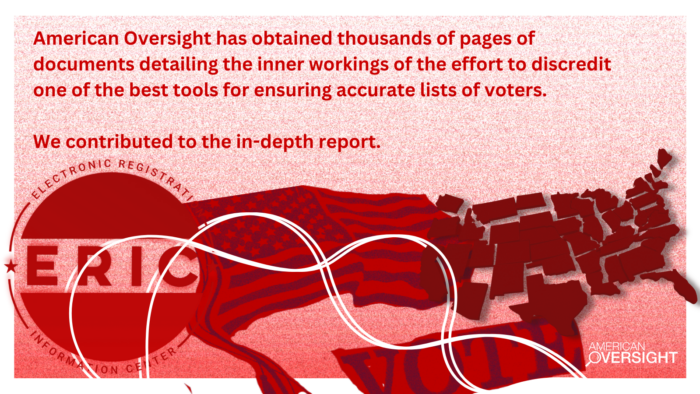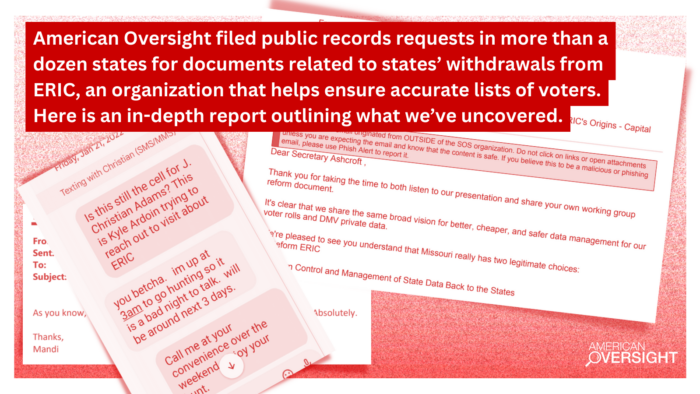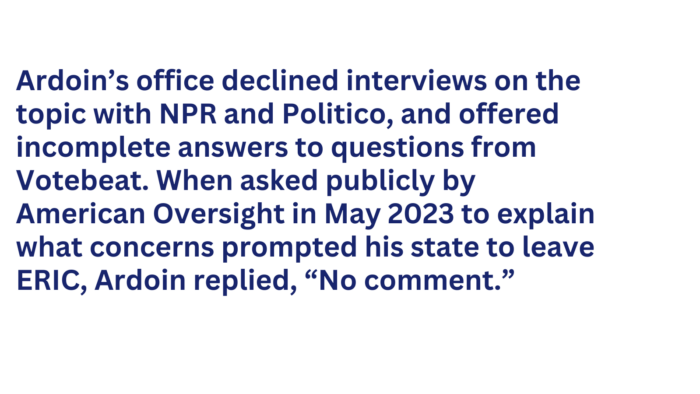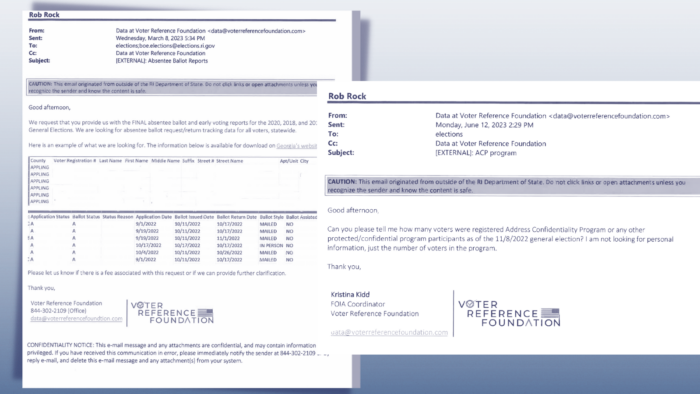Explaining the Campaign Against Nonpartisan Voter-Roll Tool ERIC: A Four-Part E-Course
In December 2023, American Oversight distributed a digital e-course on how the election denial movement led nine states to leave the Electronic Registration Information Center (ERIC), a nonpartisan organization that helps them maintain up-to-date voting lists. Each day, subscribers received an email newsletter that focused on key elements of the effort to dismantle ERIC. Here, we have reposted this e-course to make it more accessible to readers.
 The Campaign to Dismantle ERIC
The Campaign to Dismantle ERIC
With another monumental election year on the horizon, the election denial movement is poised to continue its effort to undermine U.S. democracy thanks to a sustained campaign against one of the leading tools for ensuring accurate voter lists: the Electronic Registration Information Center (ERIC).
Conservative activists and politicians who profess to be gravely concerned about “election integrity” and the state of the country’s voter rolls have, over the past two years, pressured nine Republican-led states to reject ERIC, a nonpartisan organization that many of those same state leaders had previously touted.
The story of how ERIC became a political lightning rod is one of far-right misinformation; the cynical opportunism of so-called “election integrity” leaders and activists dedicated to reducing access to the ballot; and the staying power of an election-denial movement that grew out of former President Donald Trump’s false claim that he had won the 2020 presidential election.
American Oversight began investigating states’ ERIC withdrawals in 2022, and have submitted public records requests to officials in more than a dozen states and filing lawsuits against the secretaries of state of Louisiana and Ohio to compel the release of documents.

In December 2023, we published “The Campaign to Dismantle ERIC,” an in-depth look at the thousands of pages of public records we obtained and what the attacks on the nonpartisan system mean for our democracy in 2024. We’ve created this four-day newsletter e-course to explain our findings — and talk about why it matters.
Each day will tackle a different topic. Today, we will explain how a fringe right-wing website set off a cascade of misinformation and spurred an anti-ERIC campaign that led Louisiana to abandon the partnership, eventually joined by eight other states. Tuesday’s newsletter will examine how states have scrambled to find viable replacements — none of which provide ERIC’s security, reliability, or effectiveness. On Wednesday, we will discuss how election denial activists are now pushing their own ERIC alternatives that would make it easier to challenge the voting rights of thousands. Finally, Thursday’s will explore how the exodus from ERIC will make it harder for election administrators to do their jobs at a time when they are already under unprecedented attack for their work.
Let’s get started.
- The Article That Started it All
- Other States’ Withdrawals
- The Scramble to Replace ERIC
- Election Deniers’ Ties to ERIC Alternatives
- ERIC Withdrawals and Threats to Democracy
The Article That Started It All
ERIC operated with a relatively low public profile until January 2022, when the fringe right-wing website Gateway Pundit published a multi-part series of articles maligning it. Gateway Pundit founder Jim Hoft, who wrote the series, has been an enthusiastic purveyor of false claims about 2020, and his articles relied heavily on voter-fraud alarmist J. Christian Adams, a conservative elections attorney.
ERIC has debunked the Gateway Pundit’s false allegations, as have several media outlets. But on January 27, 2022 — just a week after the first Gateway Pundit anti-ERIC article — Louisiana Secretary of State Kyle Ardoin announced that he would be suspending his state’s ERIC membership. Although Ardoin’s office told Votebeat the decision had “nothing to do with” the Gateway Pundit articles, its timing — and records obtained by American Oversight — raise questions about the influences behind his announcement.
The day after the first article, an official in the secretary’s office forwarded Ardoin a statement from ERIC’s executive director that addressed falsehoods in the article. That same evening, Ardoin replied to top staff in his office: “I’m likely going to suspend our membership until we can make sure our data isn’t being used or supplie[d] to other organizations,” he wrote, indicating he was aware of both the article and ERIC’s refutation. Also that night, Ardoin texted Adams, asking for a call to discuss ERIC. Adams responded that he would be available over the next three days.
Other records we obtained reveal that around that time, Ardoin was also in touch with prominent election deniers, including Phil Waldron and Draza Smith, both of whom he had invited to speak at a meeting of the Louisiana Voting Commission the month before. He also later was in touch with Trump-allied attorney Cleta Mitchell, whose network of “election integrity” activists became integral to the anti-ERIC campaign.
Since Louisiana’s withdrawal from ERIC, Ardoin has continued to insist he made the decision based on privacy concerns, but has failed to clarify what those concerns are or to provide any other justification. Ardoin’s office declined interviews on the topic with NPR and Politico, and offered incomplete answers to questions from Votebeat. When asked publicly by American Oversight in May 2023 to explain what concerns prompted his state to leave ERIC, Ardoin replied, “No comment.”
Other States’ Withdrawals
Louisiana’s withdrawal in 2022 set the stage for a fast-growing anti-ERIC campaign, resulting in a wave of states exiting in early 2023. Alabama’s new secretary of state, who campaigned on a pledge to withdraw the state from ERIC, was the first, announcing the withdrawal upon assuming office.
In March, with former President Trump having called upon other Republican state leaders to do the same, states began to leave ERIC in a more coordinated fashion. Florida, West Virginia, and Missouri all announced decisions to leave on the same day; less than two weeks later, Ohio and Iowa followed suit, despite — just the month before — both states’ secretaries of state having praised ERIC. Iowa’s Paul Pate had lauded ERIC as “a godsend” and Ohio’s Frank LaRose raved that ERIC was “one of the best fraud-fighting tools that we have” and that it had “provided great benefit for us.” In May came Virginia’s decision, and Texas moved to withdraw that summer.
The records we obtained show several state offices meeting with election deniers around the time of the withdrawals. For instance, in February election denial activist Heather Honey — who had worked on the Arizona Senate’s sham “audit” of 2020 election results and joined forces with Cleta Mitchell — had emailed the Missouri secretary of state’s office to advocate for “Return[ing] Control and Management of State Data Back to the States.” She also offered to research a transition plan and shared data as well as reports containing baseless accusations.
The documents detailed in the report also highlight the artifice of many state leaders’ public explanations for their decisions. Top officials expressed concern about leaving ERIC, even as their state moved to do so:
- Emails from January 2022 show the Missouri secretary’s chief of staff characterized the first of the Gateway Pundit’s articles about ERIC as “horrible and misleading.”
- In Texas, an assistant secretary of state emailed state Rep. Matt Shaheen’s chief of staff in January 2023 to respond to a question about ERIC, debunking the Gateway Pundit’s misinformation and explaining the benefits ERIC membership provided Texas.
- On the day Ohio withdrew in March, Amanda Grandjean, then the state’s director of elections, wrote to ERIC Executive Director Shane Hamlin, “As you know, I really worked as hard as I possibly could to avoid this.”
The Scramble to Replace ERIC
Our investigation into the anti-democratic movement that targeted the nonpartisan Electronic Registration Information Center uncovered records that provide telling details about how states that abandoned the system have scrambled to replicate it.
Public reporting and records obtained by American Oversight also paint a picture of officials failing to adequately prepare election officials, and in several cases seeking key information or working on new programs well after they had made the decision to withdraw.
Months after their withdrawals from ERIC, officials in Alabama and Virginia were working to obtain data that could help them clean voter rolls the way ERIC did.
- Alabama withdrew from the organization in January 2023. In March, the state’s director of elections emailed the executive director of the National Association of State Election Directors asking how to obtain National Change of Address data — a critical component of voter roll list maintenance.
- In August 2023, three months after announcing its withdrawal, Virginia purchased the Limited Access Death Master File (LADMF). The LADMF contains data with the Social Security numbers of individuals whose deaths were reported — data used to clean voter rolls that is accessible through ERIC.
- The next month, Virginia entered into a $28,960 contract to SysAudits for the sole purpose of auditing LADMF data compliance, underscoring the high cost of withdrawing from ERIC.
Election authorities and experts in Missouri were also concerned about the lack of a clear plan for voter roll maintenance following the state’s exit in March.
- That month, the state’s Association of County Clerks and Election Authorities issued a statement calling on Missouri to “pursue an alternative resource” that would give local officials the necessary tools “to ensure secure, accurate, and efficient elections.”
- The records we obtained reveal that guidance about Missouri’s plan for post-ERIC list maintenance was not provided to local authorities until June — nearly three months after its withdrawal.
The creation of new cross-state data-sharing agreements — an effort led in part by the Ohio secretary of state’s office — seems to have begun only after Ohio and Iowa had announced the suspension of their ERIC memberships.
- On March 22, 2023, the Ohio elections director sent an email to officials in several states, requesting the convening of a “working group of states that would like to discuss ideas for securely sharing voter history and other relevant data for the purposes of identifying and investigating potential cross-state voter fraud.”
- The working group met regularly between March and June — after states had already left ERIC — to review potential data sources and discuss legal options for data-sharing agreements.
In June, Georgia and South Carolina signed the first of several interstate data-sharing agreements. Two months later, Georgia signed a similar agreement with Alabama to establish “a process for each State to improve the accuracy of each State’s voter registration list by identifying duplicate voter registration.” Public reporting and other records show several other states have finalized such agreements; we also obtained a draft memorandum of understanding between Missouri and Florida. Each agreement is subject to its own terms and security arrangements without any common quality control — another challenge in trying to match ERIC’s effectiveness.
Unlike ERIC, which was conceived in 2009 but not operable until 2012, the cross-state voter-roll maintenance plans appear to have been designed in a matter of months. A host of issues are still to be worked out, and the security and effectiveness of the quickly assembled patchwork of agreements remains unclear.
Reporting by NPR in October, which drew upon several documents obtained by American Oversight, noted the agreements appeared to lack the kind of details that made ERIC so reliable. As one former county clerk in Utah told NPR, “These states have decided that instead of using a wheel, they’re going to invent a spherical device that will allow them to easily transport and roll items from A to B.”
Election Deniers’ Ties to ERIC Alternatives
The hasty abandonment of ERIC by several states has provided fertile ground for activists and private interests — including many of the same people involved in efforts to overturn the 2020 election — who see an opportunity to continue to undermine trust in U.S. democracy by inserting themselves into voter roll maintenance and election administration.
At the same time, outside groups and private companies supported by election deniers have developed new products that experts warn will make it easier for voter-fraud vigilantes to challenge and threaten the voting rights of thousands.
 Cleta Mitchell
Cleta Mitchell
In meetings with top election officials, Cleta Mitchell — a lawyer involved in the effort to overturn the 2020 election — and associates in her Election Integrity Network have pushed to be more closely involved in voter roll maintenance.
- We obtained a May 2023 email from Mitchell to West Virginia Secretary of State Mac Warner’s general counsel and chief of staff: “You made reference last week to some databases that your office and clerks used in your efforts to clean voter rolls,” Mitchell wrote. “Do you mind sending me those databases and any information about them, so I can forward them to the National Working Group on Voter Rolls?”
- A June 2023 email also illustrates the extent to which, with ERIC out of the picture, Warner’s office was working with Mitchell’s network. In the email, the Election Integrity Network’s Julia Hecht mentioned that Warner’s general counsel had requested a handout that had been shared by Rick Richards, a retired Georgia medical doctor who in summer 2022 founded a company known as EagleAI NETwork.
EagleAI
EagleAI is a database used by right-wing activists on the hunt for voter fraud. Reporting by Documented found that Valid Vote, EagleAI’s associated nonprofit, was formed around the same time by Compass Legal Group, a firm associated with Mitchell.
- Election experts have uniformly been unimpressed by EagleAI. Earlier this year, Georgia Elections Director Blake Evans told NBC News, “EagleAI draws inaccurate conclusions and then presents them as if they are evidence of wrongdoing,” adding that the program “offers zero additional value to Georgia’s existing list maintenance procedures.”
Despite these vulnerabilities, EagleAI and its proponents, including Mitchell, have argued for state and local election officials to use the company’s voter roll management software as an “alternative” to ERIC. In early December, Georgia’s Columbia County agreed to use EagleAI even after warnings by voting-rights experts and the state elections board that the system could not be trusted to provide reliable information.
- Records obtained by American Oversight include an email from the Columbia County elections director to Richards just two months earlier asking about an alleged “hack” that had been mentioned at a county election board meeting.
- Richards acknowledged that EagleAI servers became inoperative in October “possibly due to an attack on the Windows server software.” Richards said that the company took security “very seriously” and noted that EagleAI “contains only public available data” — a shortcoming shared by the inter-state agreements seeking to replicate ERIC, whose secure use of information from non-public databases makes it reliable and effective.
VoteRef.com
Reporting suggests EagleAI interacts with VoteRef.com, an online project run by Gina Swoboda, the executive director of the Voter Reference Foundation and a former organizer of Donald Trump’s 2020 campaign in Arizona.
Voting-rights and privacy advocates have voiced concerns that, like EagleAI, VoteRef could be used not just to compromise individual privacy, but also to intimidate voters, cause mass cancellations of voting registrations, and inundate local election offices with burdensome, time-consuming, and inaccurate challenges.
- Mitchell also appears to be involved in facilitating connections between VoteRef and election officials: Records we obtained show that Mitchell introduced Swoboda to Wyoming Secretary of State Chuck Gray in January 2023 and corresponded over text about voter identification records and Gray’s statements in support of auditing ballot counts by hand.
- Information gleaned from VoteRef has fueled numerous voter challenges and fraud allegations. In February, Ian Camacho — the research director of a group that supported defendants facing charges for participating in the January 6 insurrection — contacted a Texas Senate staffer asking about the status of dozens of challenges submitted by an “anonymous tipster” known as Totes Legit Votes.
- Records of similar complaints lodged by Camacho and Totes Legit Votes with the Missouri secretary of state’s office in March suggest that they had used the VoteRef database. Camacho also cited VoteRef data in an email to election officials in Wake County, N.C., alleging instances of double voting.
Omega4America
Another voter data monitoring software being pushed by fraud activists is Omega4America. According to the Texas Tribune, the software was initially funded by MyPillow CEO and prominent election denier Mike Lindell. The program’s creator, Jay Valentine, was active in post-2020 election denial efforts, as revealed in other documents we uncovered, including by pushing his “fractal programming technology” as a way to identify supposed voter-roll issues.
- In Arizona, state Sens. Wendy Rogers, a vocal election denier, and John Kavanagh both separately emailed Swoboda to ask for her thoughts about Omega4America.
- Valentine also appears to be trying to step into the empty space ERIC once filled. In March 2023, Valentine sent a letter to Texas Sen. Bryan Hughes, who sponsored the legislation pulling Texas out of ERIC, offering to demonstrate how Omega4America’s Fractal technology could be used “to study Texas voter rolls and clean them of phantom voters and fake addresses.”
- Valentine also pitched the system to Texas Secretary of State Jane Nelson in May as “the most comprehensive, scalable voter roll management, reporting and monitoring system in production today.”
- Other documents obtained by American Oversight and reported on by NPR reveal that in August, Nelson shared with top staff an “[i]nteresting article” written by Valentine about his Fractal technology.
Notably, none of the replacement programs or interstate agreements contain provisions aimed at increasing voter participation. Despite the demonstrated effectiveness of ERIC — and the unproven claims, uncertain costs, and alarming opportunities for voter intimidation inherent in programs like EagleAI and VoteRef — election deniers are fiercely advocating for ERIC replacements that would advance their own anti-democratic agenda, and perhaps line their pockets.

ERIC Withdrawals and Threats to Democracy
As states continue to struggle to find or devise adequate alternatives to ERIC, the full repercussions of their hasty abandonment of the partnership have yet to be realized. But with the 2024 primary elections just around the corner, election experts and voting rights advocates are concerned about the impact, particularly as activists and groups with a demonstrated antipathy toward widening access to the ballot attempt to fill the void.
“We are concerned that conspiracy theorists have targeted ERIC, and that since they started doing so, nine states have left ERIC — often without the prior knowledge or approval of local officials who have depended on the program for years,” stated the Brennan Center for Justice. “We are equally concerned that state officials and election denial activists are developing and considering other list maintenance tools that appear to be far less reliable and that may risk: 1) intimidating and disenfranchising voters; 2) generating misinformation about the accuracy of our elections; and 3) compromising data privacy.”
Voter fraud in the United States is extremely rare. In 2007, the Brennan Center found fraud incident rates to be between 0.0003 percent and 0.0025 percent; a 2014 study by the Washington Post found that out of more than 1 billion ballots cast between 2000 and 2014, there were only 31 credible instances of impersonation fraud. Other reputable studies have consistently concluded that incidents of fraud are negligible.
But for decades, overblown claims have been used by conservative activists and strategists to justify new voting restrictions and to push back at attempts to make it easier for people to cast ballots. Former President Trump’s lies about a stolen election took the long-simmering myth of widespread voter fraud and turned it into an existential threat not only to the efficient and safe administration of elections, but also to American democracy itself.
“Building and maintaining confidence in our elections has never been more important, and trusted, bipartisan resources such as ERIC help do exactly that,” said nonpartisan Secure Democracy. By bowing to conspiracy theories and baseless claims about ERIC, leaders of the nine states that have withdrawn from ERIC have made it harder for their officials to ensure that elections are administered efficiently and safely — and have increased the potential for post-election chaos that can fuel more false claims of fraud based on faulty analyses of voter lists.
“Abandoning ERIC will not only needlessly create extra work for election officials, making it more challenging for them to ensure that their voter rolls are up to date, but also harms voters by subjecting them to potential removal from the registration rolls based on unreliable information,” said Jonathan Diaz, the director of Campaign Legal Center. He continued, “The exodus from ERIC threatens to make our democracy less secure, eroding voters’ confidence in the system as we head into a crucial election year.”
While instances of actual fraud remain few and far between, the potential for disenfranchisement thanks to overzealous activists — who either believe the lies about a stolen election or see the partisan advantage in stoking those fears — is of grave concern. That threat is particularly acute for people of color and members of marginalized communities whose voting rights have long been targeted or who are more vulnerable to challenges. “We commend those election officials who have resisted these calls to withdraw despite efforts from election deniers to push conspiracy theories and faulty systems to replace ERIC, many of which will put voters at risk of being improperly removed from registration lists and having their their personal information leaked or misused,” said Sylvia Albert, the director of Common Cause’s Voting and Elections Program.
As Voting Rights Lab has noted, at the same time ERIC has become a punching bag for right-wing election deniers, “many state legislatures are manufacturing new reasons for removing eligible voters from the rolls and/or creating new systems that lack safeguards protecting against the wrongful removal of eligible voters — instead of focusing on ways to ensure that every eligible voter registers to vote.” The objections to ERIC’s proactive outreach to unregistered voters is a glaring reminder of the choice not to prioritize increasing access to the ballot.
This is a critical juncture for American democracy. The election denial movement did not disband after the failed coup of January 6, 2021, and it is rooted in the same forces that for decades have fought against efforts to widen access to the ballot and have used baseless claims of fraud to render illegitimate the will of voters. “We have many systems that keep our elections safe, secure, and fair,” added Albert of Common Cause. “It is crucial to combat disinformation that is rooted in false narratives and designed to harm voters.”
A central task in countering that disinformation is exposing the communications of government officials, including with whom they have met and what they have said behind closed doors. The government records detailed in this report reveal the hollowness of state leaders’ public explanations for leaving ERIC, their failures in fulfilling their obligations to find replacements for such a vital tool, and the outside individuals and groups pushing ERIC’s demise for political or financial reasons.
Our system of government depends upon an engaged and informed electorate. As another monumental election year approaches, the American people deserve to know how lies about the last election continue to threaten the health and strength of our democracy.